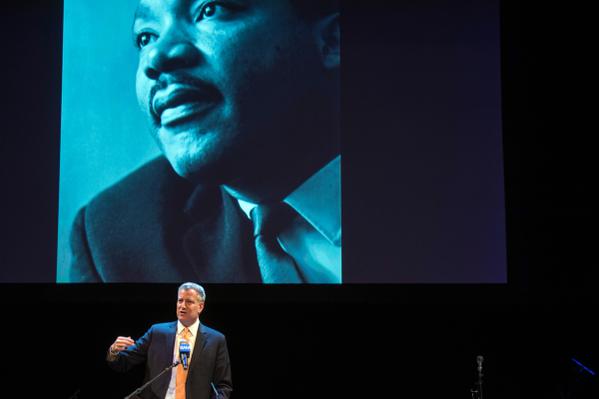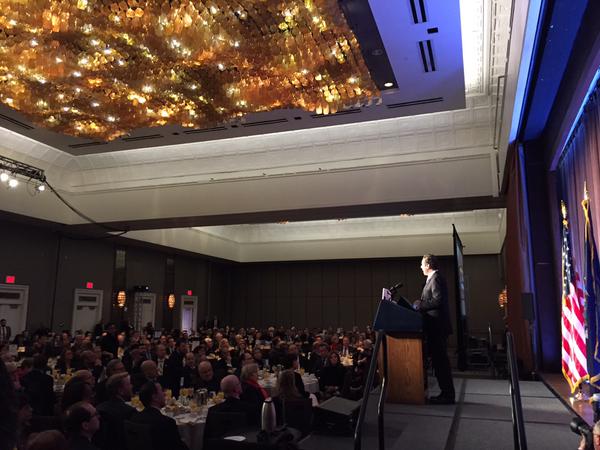Spike in Concerns About Race Provides Opportunity

Mayor de Blasio speaking at BAM on MLK Day (photo: @BilldeBlasio)
It's hard to imagine a single Martin Luther King Day event in New York City this week which did not include urgent expressions of concern about race in our hometown—both from the podium and in the crowd.
After a torrid summer and fall of protests following the tragic deaths of two unarmed black men – Eric Garner and Akai Gurley – at the hands of police, we are now suffering through a winter of cold war between police unions and City Hall after the assassination of two officers, appallingly gunned down amid the strife.
Recent polling reflects the mood of a troubled public stuck in the middle of all this, supporting police but clearly hearing protesters. New Yorkers are also fearing what the ongoing conflict means for race relations. Just two years ago, more than half of New Yorkers thought race relations were excellent or good. Now less than a third do, according to a Siena College survey released Monday.
Those numbers have undoubtedly dropped because of the disturbing string of events having to do with the police, including the standoff between the police unions and Mayor de Blasio—a fight which is rooted in a basic disagreement over how to even talk about race.
But New Yorkers' race-related anxieties were already piquing during the 2013 mayoral campaign. Though it's reasonable to argue the recent policing issues rapidly escalated concern, our mayor's victory a little more than a year ago was due in no small part to his ardent criticism of the overuse of Stop-and-Frisk in communities of color.
And New Yorkers are not just concerned about race in policing, but also about race's role in general inequality. For instance, more than half of New Yorkers now think the entire criminal justice system treats people of color unfairly. Politicians from every corner of the city talk about a yawning income gap between the haves (mostly white) and the have-nots (mostly black and Latino).
To many in New York, it's as if racial inequality 2.0 is just now being uncovered. Actually though, it's a deep-seated problem that never went away, and has seen little improvement in decades. Yet a large group of people is suddenly realizing how serious a problem it is. Those people, by the way, are mainly white.
When more than half of all New Yorkers thought race relations were excellent or good two years ago, black New Yorkers disagreed. More than half of them thought they were only fair or poor. Since then, there has been a huge increase in the percentage of white New Yorkers who are concerned - just 8 percent thought race relations were poor in 2013. Now that number has tripled to more than a quarter who think so.
It's easy to be pessimistic about progress from here. But, believe it or not, this level of distress is exactly what had to happen for things to get better.
With attention focused on the different experiences whites and blacks have in this city and state, there is an historic opportunity to make real, lasting changes. NYPD Commissioner Bratton, Governor Cuomo and other lawmakers have already put forward policies which could reduce inequality in our criminal justice system. But next we have to recognize other systemic causes of racial inequality, and seek to fix them as well.
Schools that are predominantly black are far more likely to be underfunded and underperforming. Unemployment remains devastatingly high in neighborhoods with large black populations. Even basic things like renovated subway stops and cleaner sidewalks are harder to find in majority-minority areas.
This month, the governor and mayor are setting their agendas for 2015, and our State Legislature and City Council will soon go about the annual task of doling out government funds through their budget processes. This is when we prioritize what's most important to us. This is when we have a chance to reduce the inequality that has created a far less perfect city than we are capable of and deserve.
This may be the most pivotal Martin Luther King Week we New Yorkers have had in a very long time. The current controversy over policing is important and must lead to reform. But it is also necessary to admit there is a broader problem, be determined to fix it, and to act, not just worry. We must do it now, while so many New Yorkers are finally paying attention.
***
Evan Thies is the president of Brooklyn Strategies, a public affairs and strategic planning firm that offers political advice.
***
Have an op-ed idea or submission for Gotham Gazette? E-mail editor Ben Max: This email address is being protected from spambots. You need JavaScript enabled to view it.
Three Keys to Positive Criminal Justice Reform in New York

Gov. Cuomo speaks to ABNY (photo: @NYGovCuomo)
It has been encouraging to hear Governor Andrew Cuomo call for a resolution of the unfortunate conflict that has broken out between Mayor de Blasio and the leaders of the NYPD unions. A number of our elected leaders are proposing responses to this affair and to the larger issue of the execrable state of police/community relations that has erupted across the nation over the past year catalyzed by the Ferguson and Staten Island deaths of young men of color at the hands of police officers.
Based on my experience as a lawyer and legal reform consultant, including several years as criminal justice advisor to the administration of Governor Mario Cuomo, I have three recommendations to make regarding criminal justice reform in the State of New York.
First, over the past two decades, a once vibrant movement toward community policing -- police service founded on true partnership with community stakeholders -- has been all but totally eclipsed by the kind of data-driven policing that Bill Bratton debuted in New York City in 1994. I am a witness to the fact that this style of numbers-driven policing was aggressively promoted throughout the nation and has been hugely influential. It has fundamentally changed the relationship between municipal police agencies and the public they serve and not for the better.
While many credit CompStat and other policing tactics that are descended from it for the historic reductions in crime nationwide, this style of policing has driven a wedge between police and communities of color. Crime may be going down, but public dissatisfaction has been skyrocketing. That is what protesters across the nation are saying. That is what New York City voters were saying when they elected Bill de Blasio last year. Their complaint is both legitimate and urgent. Whomever is tasked with the Cuomo Administration response to this phenomenon should be given a clear mandate to reignite the community policing movement.
Second, former Governor Mario Cuomo, may he rest in peace, signed into law Chapter 55 of the Laws of 1983, the Neighborhood Preservation Crime Prevention Act (NPCPA). This DCJS-administered program was intended to foster the creation of an infrastructure of community-based nonprofit organizations that could access new resources and collaborate with police and other municipal agencies to improve quality of life in neighborhoods that otherwise would slide into decay and criminality. This inspired piece of legislation would have empowered neighborhoods and their residents to have a major impact on the quality of life in their communities. Unfortunately, for whatever reason, NPCPA was never funded, staffed, implemented.
The kind of community-based infrastructure it would have created would have helped neighborhoods and police agencies work together in productive partnership. This law is still on the books. As the administration of Governor Andrew Cuomo moves forward in developing its response to the police/community relations crisis, I would strongly suggest taking up this piece of Mario Cuomo's legacy and fulfilling its promise at last.
Third, for over half a century, the decision of the US Supreme Court in Gideon v. Wainwright has guaranteed that poor persons who get swept up in the machinery of the criminal justice system should have effective legal representation. As all know, this promise has not been kept. Certainly, were we to address this decisively and dramatically, we would be leveling the playing field between the poor accused and the police and prosecutors who arrest them in their tens of thousands and force them into plea bargains that ruin their lives.
Any thoughtful person who contemplates the many decades over which this issue has been left on the backmost burner can only condemn the total lack of engagement by the Executive, the Legislature, and the Bar in doing what is so obviously the right thing. The shameful fact is that there has been no meaningful judicial reform in New York since the administration of Nelson A. Rockefeller and he accomplished what he did because he made it a top personal goal of his own. I ask Governor Cuomo to accept the challenge of Gideon right now when doing so would do the most good.
***
Terry O'Neill is Director of the Constantine Institute in Albany, an organization that promotes constitutional, legal and ethical standards in law enforcement and advises state and local governments on police issues. He is a lawyer and served as a criminal justice advisor to the administration of Governor Mario Cuomo from 1988 to 1994.
***
Have an op-ed idea or submission for Gotham Gazette? E-mail editor Ben Max: This email address is being protected from spambots. You need JavaScript enabled to view it.
Moving Forward with Support for Veteran-Owned Businesses

photo via @USNavy
In July of 2013 when Bill de Blasio was running for Mayor, a briefing paper was created to help bridge the cultural divide and educate all mayoral candidates on what the next administration could do to create policies helpful to military veterans in New York City.
One of the recommendations was that the next administration take the lead regarding veteran-owned small businesses and "support the development of a Veterans Business Enterprise program (VEB) through executive fiat (as a pilot program) or by working with the City Council to create legislation for the program."
The thought at that time was that especially as veterans are returning from two major wars, New York City should lead the way in creating local procurement opportunities for veteran entrepreneurs, and that by the City taking the lead, the State would more than likely follow as it did when then-Mayor Dinkins set up the city's first Minority and Women-owned Business Enterprise (M/WBE) programming over twenty years ago.
With the help of veteran business owners and advocates, who were talking to elected officials about the lack of procurement options with the City, the City Council passed Local Law 144 at the end of 2013, which required the Department of Small Business Services (SBS) to conduct a study to "analyze veteran owned business enterprises and opportunities for such business enterprises in city procurement." A lack of data on the subject and general lack of understanding of veterans' issues made this study necessary and reasonable.
In early 2014, the city partnered with PricewaterhouseCoopers to conduct the study. After almost a year, the results were finally released last month in a report from the administration. One key question the study aimed to answer was whether the City should set goals for awarding contracts to veteran-owned businesses. Overall, the study concluded, "Given the limited pool of veteran owned companies able to do business with the City and the availability of other City certification programs like M/WBE and EBE, a goals program for veterans is not recommended at this time."
The recommendation against creating a procurement goal is disappointing as many veterans believed we had an administration which better understood our needs. At the time of the report's release, a Gotham Gazette article included some discussion of the problems with the data used.
However, the problems can be fixed. There appears to have been good intentions in putting the report together and there is a major bright spot in the list of seven recommendations for increasing outreach to veterans, better training veteran business owners (VBOs) on how to do business with the city, and creating a designation for VBOs who wish to be potential vendors with the City. These recommendations make for a very good start and where SBS and the Mayor's Office of Veterans' Affairs (MOVA) can now come together and proceed, beginning with this week's City Council hearing.
A short list of recommendations - gleaned from speaking with people far more knowledgable than myself on the subject at hand - to Commissioners Maria Torres-Springer of SBS and Loree Sutton of MOVA:
-Group dynamics: It appears that SBS is taking the lead on the public forums around the report and veteran-owned businesses. Anything related to contract procurement goals will go through SBS, it seems, which makes sense. But, MOVA must also be involved. It was clear at the first feedback session on the report that SBS is less than familiar with the veteran community, which is understandable, but shows the need for Commissioner Sutton and MOVA to be integrally involved. Commissioner Sutton has a better handle, of course, on the players in the community as well as the issues veterans face, which gives her the ability (by working with Commissioner Torres-Springer) to better alleviate concerns and avoid miscommunication.
-Open and honest communication: City Council Member Eric Ulrich, chair of the veterans committee, is holding a Wednesday hearing on the report. It is essential that the commissioners and agency representatives are forthcoming and forthright. One of the most frustrating things for veterans is when we hear city officials duck questions or give non-answers. If a mistake was made, admit it and explain how we are moving on. Discuss the report's recommendations and how this report should viewed as the beginning of a road map to get to an end goal. We want to hear concrete steps.
-Planning and outreach: Be clear and communicative about what events are happening and when. Make sure that as many veterans and veteran organizations as possible know about opportunities to give feedback or attend helpful events. But also be clear about what each event is about - whether it's an event about feedback on the new report or more general support sessions for VBOs (or whatever else), it is key that flyers and other messaging are clear.
-Policy: Eventually City Hall - really Mayor de Blasio and Commissioner Sutton - will decide what the end game on contract procurement goals will be. Even though this report recommends against setting a goal, that does not mean it can't or won't happen. Once again, the administration should get input from stakeholders (which it is doing) and again consider following the election year briefing paper and conducting a pilot program, which should include getting VBOs certified and then collecting further data and evaluating to see if there should be a permanent contract set-aside for veteran businesses.
Yes, there is disappointment with the report, but still room for improvement and reason for hope. By working with the recommendations made, obtaining more input from stakeholders, and furthering communication between the agencies and with veterans, we can still make New York City a far better place for veterans to not only open and expand businesses, but do much more work with and for the City.
***
Joe Bello served 11 years in the U.S. Navy/Naval Reserve and has been a veterans advocate in New York City for almost two decades. He is the founder of NY MetroVets.
***
Have an op-ed idea or submission for Gotham Gazette? E-mail editor Ben Max: This email address is being protected from spambots. You need JavaScript enabled to view it.




